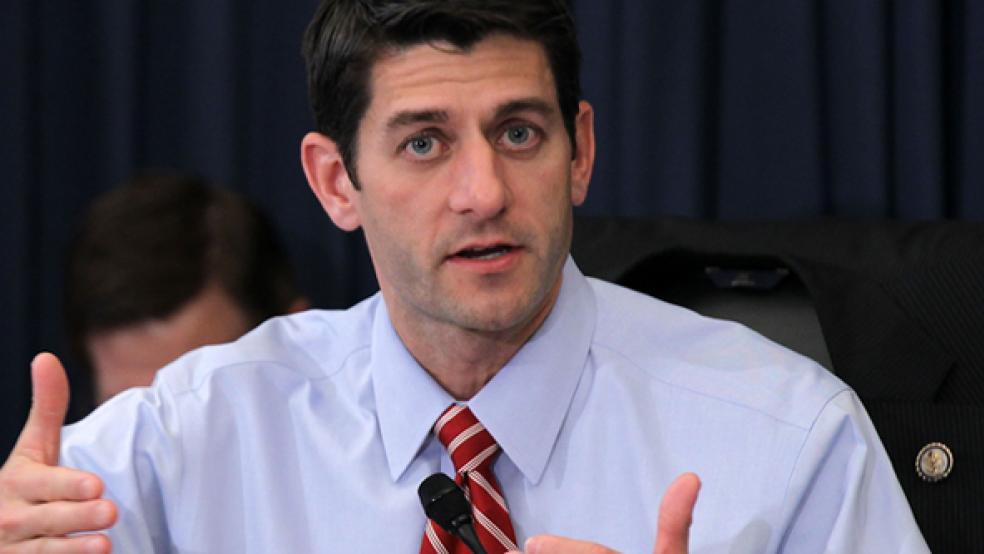For a while it looked as if the federal budget process would grind to a halt again as both parties shied away from another bruising battle over spending before the mid-term election. But House Budget Committee Chairman Paul Ryan (R-WI) signaled on Thursday that he intends to offer a tough new budget plan before the November election that would wipe out the deficit within a decade.
Speculation that Congress would punt on a new fiscal 2015 budget was fueled by Senate Budget Committee Chairwoman Patty Murray (D-WA), who revealed last month that the Democratic-controlled Senate would rely on the spending levels set by the two-year budget document that she and Ryan hammered out last December.
Related: Ryan Dusts Off His Controversial Budget Reform Plan
“We should work together to build on our two-year bipartisan budget, not create more uncertainty for families and businesses,” Murray said in a statement. “It wouldn’t be productive to re-litigate it so soon after our two-year deal.”
Moreover, there have been reports that rank and file Republicans have little appetite to vote on a new budget designed to wipe out the deficit in 10 years – as Republicans have vowed to do – or support the more than $1 trillion in reductions in Medicare, Medicaid and possibly Social Security that would be necessary to balance the budget without raising taxes.
Yet Ryan’s chief spokesman said today the chairman plans to forge ahead.
"We don't have any announcements to make at this time,” William Allison, Ryan’s press secretary, told The Fiscal Times. “It is Chairman Ryan's intent to again put forward a balanced budget."
Related: Paul Ryan’s New Idea Is Really Smart—But Will It Fly?
As a likely preview of his new budget blue print, Ryan on May 3 released a 204-page critique of the federal government's anti-poverty policies. Ryan's report, which came a day before President Obama released his fiscal 2015 budget plan, laid the groundwork for a renewal of House Republicans' efforts to overhaul or dismantle many long-standing social programs, including Head Start and Medicaid.
The report, "The War on Poverty: 50 Years Later," provides a scathing analysis of eight areas of federal assistance policy: cash aid, education and job training, energy, food aid, health care, housing, social services and veterans affairs. Still, there is plenty of skepticism that House Republicans will tackle another controversial budget resolution this year.
“I really would like to see Ryan do a budget because I think it’s important to have one out there from the Republicans,” said Robert L. Bixby, executive director of the Concord Coalition, a government spending watchdog. “But I can sort of sense that a lot of Republicans don’t think they need to do one. And politically, why emphasize the magnitude of spending cuts that would need to be made to get down to a balanced budget with ten years? Why do that in an election year?”
Related: Obama’s Social Views Trump Pragmatism in 2015 Budget
For now, the only budget on the table is the one Obama unveiled early this month. Obama’s $3.9 trillion proposal for fiscal 2015 follows on the Murray-Ryan budget deal, but includes $56 billion in additional funding to agencies, offset by $28 billion in alternative spending cuts and tax hikes to generate revenue. The proposed outlays are $250 billion higher than in last year’s budget
Stan Collender, a Washington budget expert, wrote this week in Forbes that “if you read the tea leaves it’s hard not to conclude that there’s not a great deal of enthusiasm among both House and Senate Republicans for the House to produce a budget of its own this year.”
“Indeed, the signs of uneasiness in the GOP caucus are unmistakable,” wrote Collender. “They include what can be charitably described as tepid statements of support for doing a budget by the few Republican House members who are willing to be quoted on the subject and reports about how Ryan and other GOP leaders need to poll other Republicans about whether they will vote for a budget resolution this year given the spending cuts it may include.”
“This hardly indicates that a budget is a high priority,” Collender said.
Top Reads from The Fiscal Times:





